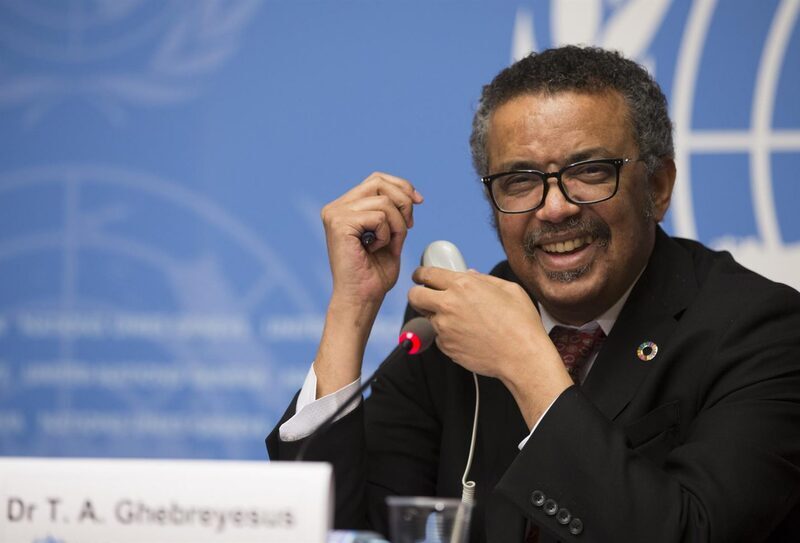
Report highlights 2 Egyptian projects among major clean energy ventures in N.Africa
A report by Energy Capital & Power highlighted two Egyptian projects – Suez Wind Power ...

World Health Organization (WHO) Director General Tedros Adhanom Ghebreyesus cautioned of quick lift of social and economic restrictions as this can risk the resurgence of the coronavirus (COVID-19).
“As you know, some countries are now considering lifting social and economic restrictions. This is something we all want – but it must be done extremely carefully. If done too quickly, we risk a resurgence that could be even worse than our present situation,” he said in remarks at the Mission briefing on COVID-19.
Almost 2 million cases of COVID-19 have now been reported to WHO from around the world, and more than 123,000 deaths.
“That’s more than 40,000 more deaths since I spoke to you last week.
This is an alarming and tragic increase. At the same time, we’re seeing encouraging signs in some countries that have been the epicenter of the pandemic,” he said.
“Our new strategy update outlines six factors for countries as they consider lifting restrictions,” he said.
“First, the transmission is controlled. Second, that health system capacities are in place to detect, test, isolate and treat every case and trace every contact. Third, that outbreak risks are minimized in special settings like health facilities and nursing homes. Fourth, that preventive measures are in place in workplaces, schools and other places where it’s essential for people to go.
Fifth, that importation risks can be managed. Sixth, that communities are fully educated, engaged and empowered to adjust to the “new norm,” he expounded.
At the same time, the virus is moving into countries and communities where many people live in overcrowded conditions, and physical distancing is nearly impossible.
“COVID-19 magnifies our existing health inequalities. Governments must consider that for some countries and communities, stay-at-home orders may not be practical, and may even cause unintended harm. Millions of people around the world must work every day to put food on the table. They cannot stay at home for long periods of time without assistance,” he said.
The World Health Organization’s position remains that all sectors affected by COVID-19—including food markets—in China and around the world need to ensure strong regulatory systems, high standards of cleanliness, hygiene and safety once they are in a position to gradually resume normal activities.
WHO maintains that governments should rigorously enforce bans on the sale of wildlife. And they must enforce food safety and hygiene regulations to ensure that food that is sold in markets is safe.
WHO has provided guidance and support to countries on safe and healthy markets, including guidance for food businesses on COVID-19 and on food safety and live markets.
WHO has been working closely with the World Organization for Animal Health (OIE) and the Food and Agriculture Organization (FAO) since the start of the COVID-19 outbreak, to prevent zoonotic diseases in all concerned sectors.
WHO is committed to working with all countries to find tailored solutions to stop transmission, while ensuring essential health services continue and mitigating the social and economic impacts of the pandemic.
“Only by working together will we bring this pandemic under control,” he stressed.
The work has to happen not only at the international and national level, but also at the community level,” he said.
Meanwhile, he said “Last week, we launched the United Nations Supply Chain Task Force, with the World Food Program and other partners inside and outside the UN.”
This emergency supply chain is designed to cover more than 30% of the world’s needs in the acute phase of the pandemic.
It will have hubs in eight countries and will deploy sixteen 747s and medium-sized cargo aircraft, plus passenger planes.
Every month we will be shipping millions of supplies, including personal protective gear, respirators, lab equipment and oxygen, as well as medical and technical staff. The first Solidarity Flight took off on Tuesday, and more will follow.
The WFP estimates it will need approximately $280 million, simply to cover the costs of storing and moving supplies. The costs of procuring supplies will be much greater.”
“We urge donors to support this vitally important system and the World Food Program. We’re all in this together. And we will only succeed together,” he concluded.
A report by Energy Capital & Power highlighted two Egyptian projects – Suez Wind Power ...
The opening concert of the Annual Meeting 2025 in Davos-Klosters will address the pressing issues ...
Juhayna Food Industries proudly announced that its agricultural arm, El Enmaa for Agricultural Development, has ...


اترك تعليقا